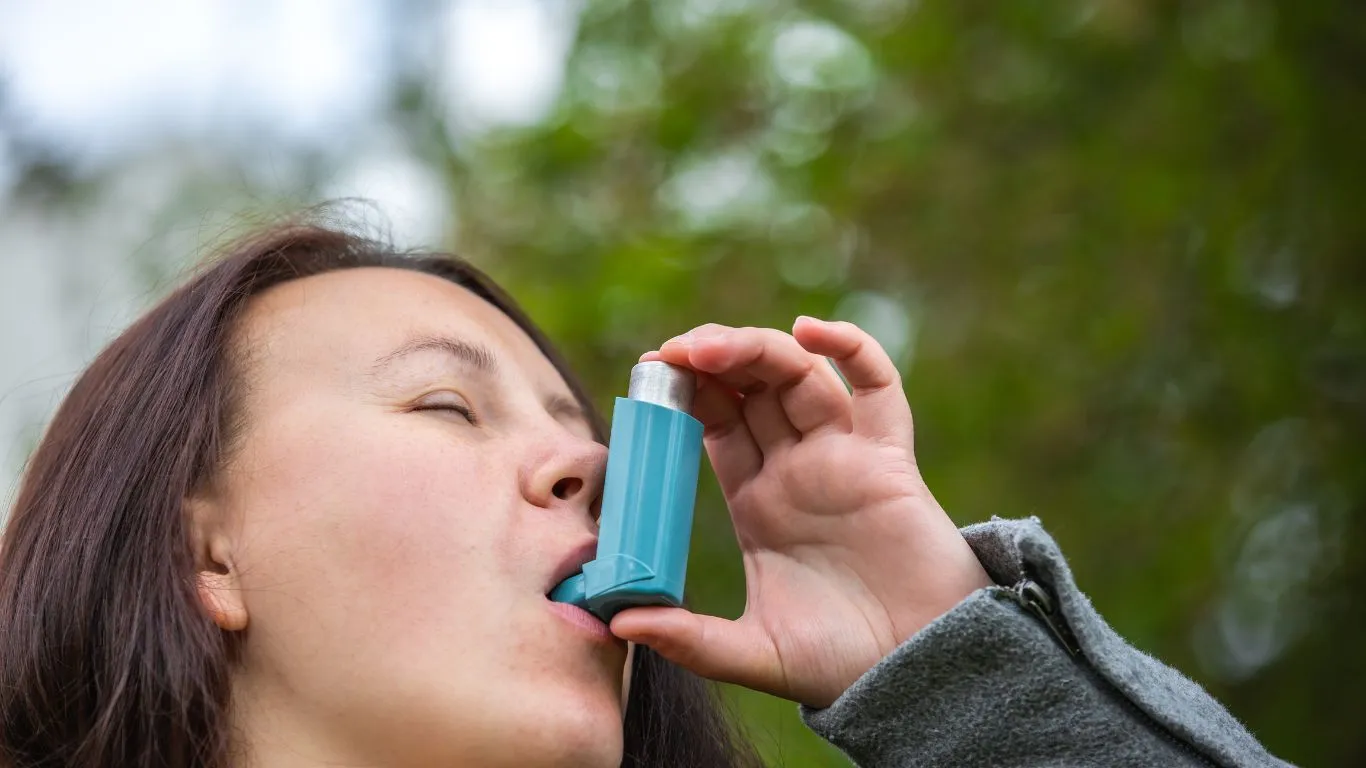Can Asthma Worsen Without Allergies? Expert Insights Revealed
Can asthma worsen without allergies? You bet it can—and it’s something I’ve seen firsthand more times than I can count. Working as a pulmonary nurse practitioner, I’ve sat with patients who were baffled by their escalating asthma symptoms even though they had zero history of seasonal allergies or known allergic triggers. If you’re scratching your head wondering how that’s even possible, don’t worry—you’re not alone. Asthma isn’t a one-size-fits-all condition, and understanding the full picture means looking beyond just allergies. Let’s dig in and make sense of what might be going on with your lungs when allergens aren’t the enemy.
Understanding Non-Allergic Asthma

What Exactly Is Non-Allergic Asthma?
When we talk about asthma, most people immediately think about pollen, pet dander, or dust mites. But here’s the thing—not all asthma is triggered by allergens. In fact, a good number of my patients have what’s called non-allergic asthma, where the symptoms aren’t tied to classic allergic reactions at all. Instead, their airways react to things like cold air, exercise, stress, or even certain infections.
I once treated a middle-aged construction worker who’d been dealing with shortness of breath and chest tightness every winter. Allergy tests? All negative. But every time the temperature dropped, so did his breathing capacity. That’s non-allergic asthma in a nutshell—it doesn’t play by the allergy rulebook.
Common Triggers That Aren’t Allergies
There are several non-allergic triggers that can make asthma worse. Knowing what to look for can help you take proactive steps.
- Cold or Dry Air: Breathing in icy air can irritate sensitive airways and spark a flare-up.
- Exercise: Especially in dry environments, exercise can lead to bronchoconstriction.
- Respiratory Infections: Colds and flu are notorious for worsening asthma.
- Air Pollution: Smog, smoke, and even strong chemical fumes can be big-time irritants.
- Emotional Stress: Yep, even stress and anxiety can cause breathing difficulties in asthmatics.
Why Asthma Can Get Worse Without Allergic Triggers

The Inflammation Factor
At its core, asthma is all about inflammation of the airways. That inflammation doesn’t always need an allergen to get fired up. Things like viral infections, long-term exposure to irritants, or even poor air quality can cause persistent inflammation. Over time, this ongoing irritation can actually remodel the airway walls, making asthma harder to control and more resistant to standard treatments like inhaled corticosteroids.
I remember a patient in her 60s who’d never had asthma before but developed it after a nasty bout of bronchitis. Months later, she was still wheezing and using her rescue inhaler more than she should. Her lungs were simply never the same after that infection—no allergies involved, just chronic inflammation that went unchecked for too long.
The Role of Age, Gender, and Hormones
Interestingly, I’ve noticed over the years that certain groups tend to have more issues with non-allergic asthma:
- Older Adults: They often develop adult-onset asthma with no allergic triggers.
- Women: Hormonal changes during menstruation, pregnancy, or menopause can influence asthma severity.
- People with Occupational Exposure: Think fumes, dust, or chemicals—those are big contributors.
It’s no coincidence that a lot of my patients who fall into these categories also have trouble managing their asthma. It’s not just about allergens—it’s about everything else your lungs are up against on a daily basis.
How to Spot Non-Allergic Worsening Asthma

Key Symptoms to Watch Out For
So how do you know if your asthma is getting worse—especially if allergies aren’t the cause? Keep an eye out for these red flags:
- Increased need for your rescue inhaler
- Wheezing or chest tightness, especially in cold weather or during exercise
- Nighttime coughing that disrupts your sleep
- Frequent respiratory infections that seem to linger
- General feeling of breathlessness without any known trigger
If you notice any of these, it’s worth talking to your provider. I always tell my patients—it’s better to check in early than wait until things spiral.
How to Manage Asthma That Isn’t Triggered by Allergies

Step One: Pinpoint Your Triggers
If allergies aren’t the culprit, then it’s time to play detective. I always tell my patients—start paying close attention to when your symptoms kick in. Is it after your morning jog? When you’re stressed out or exposed to cold air? Jot it down in a journal or use a tracking app. You’d be surprised how quickly patterns emerge.
One of my patients—a high school teacher—noticed her asthma would flare up after long days in a stuffy classroom with poor ventilation. No allergens, just stagnant air and chalk dust. Once we figured that out, she started using a portable HEPA filter and cracking the windows. Huge difference!
Step Two: Adjust Your Environment
Sometimes simple changes can have a major impact on non-allergic asthma:
- Use a humidifier if dry air worsens your symptoms
- Cover your nose and mouth with a scarf in cold weather
- Keep your home clean from dust, smoke, or strong odors
- Reduce stress through breathing exercises or mindfulness
- Limit exposure to cleaning agents or chemicals that irritate your lungs
Don’t underestimate how much your surroundings can influence your asthma—even if you’re not sneezing or rubbing your eyes like with allergies.
Treatment Approaches That Actually Work

Medications Still Matter
Just because your asthma isn’t allergy-related doesn’t mean you’re off the hook when it comes to treatment. Controller medications—like inhaled corticosteroids—are still your best defense against chronic inflammation.
I’ve worked with patients who resisted taking daily meds because they didn’t “feel sick.” But asthma isn’t always loud. Sometimes it simmers in the background, and you don’t notice until you’re in the ER gasping for air. Trust me, staying ahead of it is way easier than trying to catch up.
Other helpful treatments include:
- Long-acting bronchodilators: Often paired with corticosteroids for maintenance
- Leukotriene modifiers: These can reduce inflammation and help control symptoms
- Biologics: For severe cases, even if allergies aren’t involved
Don’t Forget the Rescue Inhaler
Keep it close, but if you’re using it more than twice a week, that’s a red flag. I always advise patients to let us know when that’s happening so we can reevaluate your treatment plan. We’re not just treating flare-ups—we want to prevent them altogether.
Can Asthma Worsen Without Allergies Over Time?

Short Answer: Absolutely
Asthma that’s not tied to allergies can be sneaky. It may not come with obvious red flags like hay fever or itchy eyes, but it can still progress if not managed correctly. Over time, chronic, untreated airway inflammation can cause long-term lung damage and increase your risk for frequent hospitalizations or steroid dependence.
I had a patient in his late 50s who thought his asthma was “mild” because he didn’t have allergic reactions. But by the time he came in, he had daily symptoms and needed oral steroids three times in one year. That’s not mild—that’s a flare-up waiting to happen. We adjusted his maintenance plan, added a low-dose ICS/LABA combo, and focused on inflammation control. Within three months, his symptoms were nearly gone.
How to Stay Ahead of It
The good news? Non-allergic asthma doesn’t have to take over your life. With the right management plan and a little self-awareness, you can stay in control.
- Check in regularly with your healthcare provider
- Update your asthma action plan every 6–12 months
- Get a flu shot annually and stay current on vaccines
- Ask about spirometry testing to track your lung function over time
- Never downplay your symptoms—even if they’re mild
In my practice, I encourage patients to take asthma as seriously as any chronic illness. Just because it’s not allergy-driven doesn’t mean it’s not impactful. Every breath matters—and sometimes it just takes a few smart tweaks to get your lungs back on track.
Living Well With Asthma—Even Without Allergies

It’s Not Just About Medication
Managing asthma without allergies doesn’t stop at inhalers and prescriptions. It’s a whole lifestyle thing. I always remind my patients—and even myself when I get winded climbing stairs (yes, I’m human too!)—that asthma management is a daily commitment. And it doesn’t have to be overwhelming. Small, consistent habits can make a huge difference.
For example, I’ve seen folks thrive once they started incorporating daily walking, cleaner indoor air practices, and actually using their peak flow meters (which often sit forgotten in drawers). These tools help give you a clearer picture of your baseline lung function and alert you when something’s off—even before symptoms spike.
Exercise Isn’t Off the Table
One of the biggest myths I hear is, “I have asthma, so I can’t work out.” That couldn’t be further from the truth—even if your asthma isn’t triggered by allergies. In fact, regular physical activity can actually improve lung function and help with symptom control.
The key? Warm up properly, avoid exercising in extreme weather, and know your limits. I worked with a patient who loved cycling but struggled every spring. We figured out it wasn’t pollen—it was cold, dry air on early morning rides. Once he switched to afternoon sessions and used a pre-exercise inhaler, things turned around fast.
When to Revisit Your Asthma Action Plan

Don’t Set It and Forget It
Your asthma action plan isn’t a one-and-done document—it should evolve with your health. I recommend checking in with your healthcare provider at least twice a year, or any time your symptoms change. That goes double if your asthma isn’t allergy-related, since those triggers are often more subtle and less predictable.
Make sure your plan includes:
- Your current daily and rescue meds
- Known non-allergic triggers (like cold air, strong smells, or stress)
- Peak flow monitoring guidance
- When to seek urgent care or call 911
It sounds like a lot, but having a clear guide can reduce anxiety—especially during a flare-up. I’ve seen patients regain confidence just from knowing they’ve got a plan in place that actually works for their lifestyle.
Real Talk: The Emotional Side of Asthma
It’s More Than Just Lungs
Let’s be real—living with asthma can be frustrating, especially when it doesn’t follow the “classic” pattern people expect. I’ve had patients feel dismissed or misunderstood because their symptoms didn’t align with seasonal allergies or pet exposure. But that doesn’t make their experience any less valid.
One of the most overlooked triggers? Stress and anxiety. And if you’ve ever had an asthma flare in the middle of a tense situation, you know exactly what I mean. I often recommend combining medical treatment with stress-reducing practices like yoga, deep breathing, or even therapy. It’s all part of the puzzle.
You’re not just managing a set of symptoms—you’re managing a quality of life. And you deserve care that recognizes the full picture.
Can Asthma Worsen Without Allergies? Final Thoughts
Absolutely—But You’re Not Powerless
If there’s one thing I want to drive home, it’s that non-allergic asthma is just as real, serious, and manageable as the allergy-triggered kind. It might fly under the radar more often, but with proper care, awareness, and a solid support system, it doesn’t have to control your life.
I’ve helped hundreds of patients breathe easier, and while each case is different, one thing is always true: understanding your unique triggers and sticking to a personalized plan can be a game-changer.
So yes, asthma can absolutely worsen without allergies—but with the right tools and team behind you, it doesn’t have to.
References
- https://www.ginasthma.org/
- https://www.aafa.org/
- https://www.lung.org/
- https://www.cdc.gov/
- https://www.mayoclinic.org/
Disclaimer
This article is intended for informational purposes only and should not be taken as medical advice. Always consult with a licensed healthcare provider before making changes to your asthma treatment or care plan.

Bianca Nala is a compassionate Nurse Practitioner with a strong background in primary and respiratory care. As a health writer for Healthusias.com, she combines her clinical expertise with a talent for clear, relatable storytelling to help readers better understand their health. Bianca focuses on topics like asthma, COPD, chronic cough, and overall lung health, aiming to simplify complex medical topics without losing accuracy. Whether she’s treating patients or writing articles, Bianca is driven by a single goal: making quality healthcare knowledge accessible to everyone.







